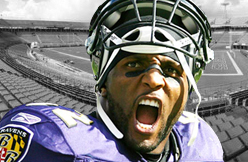Ray Lewis was born to play football, so much so that you wonder if he'll ever find the joy and satisfaction in the rest of his life that he found on the field.
You go ahead and pick your iconic image of the man. Here's mine: No. 52 with shoulders hunched, glowering across the line of scrimmage, face paint streaked with sweat, eyes boring in on the quarterback in the seconds before the ball is snapped.
Whether we ever got to know the real Ray Lewis in his 17 years in Baltimore is debatable, and we'll get to that in a moment.
But here's what we do know: He was the best middle linebacker ever to play the game. And maybe he was the best defensive player of all time, too.
He was a two-time NFL Defensive Player of the Year and a 13-time Pro Bowl selection, and he played with an unmatched passion and a love for physical contact that was astonishing.
That's why I always maintained that having a jacked-up Lewis do the “squirrel dance” before home games was a smart move on the part of the Ravens. It let him blow off steam. Otherwise, he would have simply roared out of the tunnel during the introductions and laid out some poor sucker on the other team's sideline, earning an ejection even before the national anthem.
Opponents feared him like no one else. No one hit harder than Ray Lewis in his prime. He had speed, incredible sideline-to-sideline quickness and a complete disregard for his own well-being.
He didn't just tackle. He obliterated.
“You always knew you'd better know where No. 52 was at all times,” former Tennessee Titans running back Eddie George told The Tennessean newspaper. “Because if you didn't — if you weren't paying attention — that could be the end of your career.”
In a memorable game against the Titans in November 2001, Lewis hit George so hard that former Ravens cornerback Chris McAlister famously observed that George “folded like a baby” afterward.
But George was hardly the only NFL player who was gun-shy after a hit by Lewis.
Chris Sanders, the former Titans wide receiver, conceded being so terrified of the Ravens' fearsome linebacker that he hit the turf in one game rather than absorb another blow.
Ray Lewis had a work ethic second to none, with an offseason training regimen that would make a Navy SEAL blanch.
He was the undisputed leader of the Ravens, their spiritual heart and soul. He was a master motivator, a true gridiron preacher who made believers of his teammates. Paul Kruger was just one of several Ravens who told me that after listening to one of Lewis' amped-up pregame sermons, you'd go out and fight a pack of timberwolves for the man.
He played with a chip on his shoulder and insisted that his teammates did, too. Would it shock you to know that one of Lewis' all-time favorite movies is “Gladiator”?
The story of Maximus, powerful Roman general beloved by the masses who is unfairly toppled and reborn as a gladiator burning to exact revenge against his tormentors — that is so Ray Lewis, it's frightening. Except Russell Crowe couldn't summon half the inner fury that fueled Lewis for all those years since his tough childhood in Lakeland, Fla.
Off the field, Lewis was a more complicated figure.
The Ravens will tell you he turned his life around after he and two friends were implicated in the killings of two young men in Atlanta after the Super Bowl 13 years ago.
Murder charges against Lewis were dropped in exchange for his testimony against his co-defendants. He was found guilty of a single charge of obstruction of justice. Eventually, he paid the victims' families to put several lawsuits behind him.
But Lewis never really explained his actions on that tragic January morning that left two men bleeding to death, two families torn with grief, and a host of questions about what exactly happened and who was responsible.
Outside Baltimore, the town he grew to love and where he became a generous donor to civic and charitable causes, Lewis has been a polarizing figure.
His critics ripped him for being self-centered, egotistical and melodramatic. They accused him of using his deep religious faith as a shield to ward off uncomfortable questions about performance-enhancing drugs that surfaced right before the Super Bowl in the midst of his “last ride” reverie.
But Ravens fans embraced him like no other player in the team's history. And whether they ever got to know the real Ray Lewis was immaterial to them.
The Ray Lewis they watched for 17 years was plenty good enough.

(baltimoresun.com)



